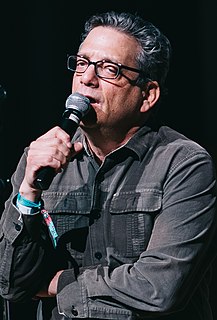A Quote by Adrian McKinty
Human beings are pattern-seeking animals. It's part of our DNA. That's why conspiracy theories and gods are so popular: we always look for the wider, bigger explanations for things.
Related Quotes
In a culture fueled by burnout, a culture that has run itself down, our national resilience becomes compromised. And when our collective immune system is weakened, we become more susceptible to viruses that are part of every culture because they're part of human nature - fear-mongering, scapegoating, conspiracy theories, and demagoguery.
I went to a heavy metal concert. The singer yelled out, "How many of you people feel like human beings tonight?" And then he said, "How many of you feel like animals?" The thing is, everyone cheered after the animals part, but I cheered after the human beings part because I did not know there was a second part to the question.
Because those who hold conspiracy theories typically suffer from a crippled epistemology, in accordance with which it is rational to hold such theories, the best response consists in cognitive infiltration of extremist groups. Various policy dilemmas, such as the question whether it is better for government to rebut conspiracy theories or to ignore them, are explored in this light.
History leaves no doubt that among of the most regrettable crimes committed by human beings have been committed by those human beings who thought of themselves as civilized. What, we must ask, does our civilization possess that is worth defending? One thing worth defending, I suggest, is the imperative to imagine the lives of beings who are not ourselves and are not like ourselves: animals, plants, gods, spirits, people of other countries, other races, people of the other sex, places and enemies.
To be nonviolent to human beings and to be a killer or enemy of the poor animals is Satan's philosophy. In this age there is always enmity against poor animals, and therefore the poor creatures are always anxious. The reaction of the poor animals is being forced on human society, and therefore there is always strain of cold or hot war between men, individually, collectively or nationally.
One of the things that I tell beginning writers is this: If you describe a landscape, or a cityscape, or a seascape, always be sure to put a human figure somewhere in the scene. Why? Because readers are human beings, mostly interested in human beings. People are humanists. Most of them are humanists, that is.




































